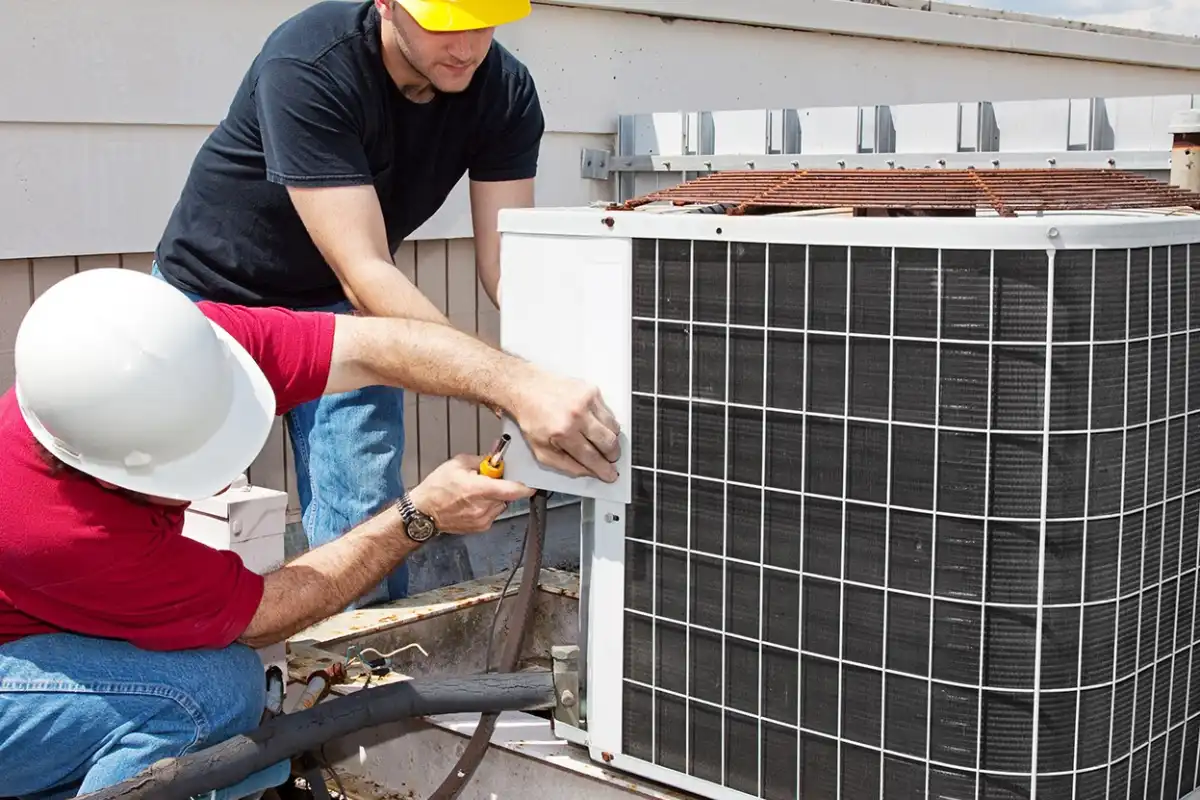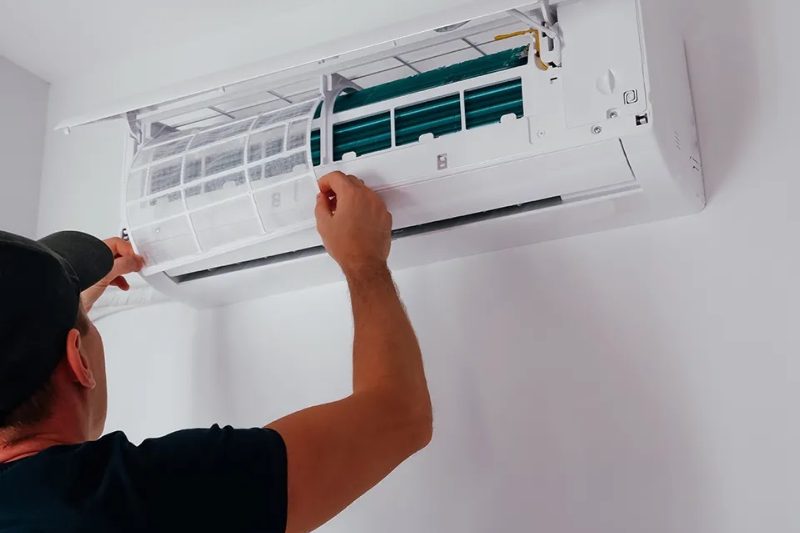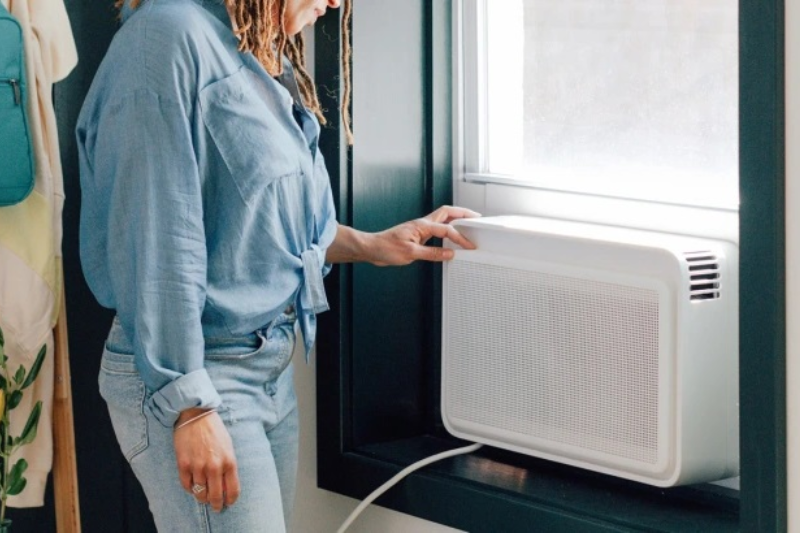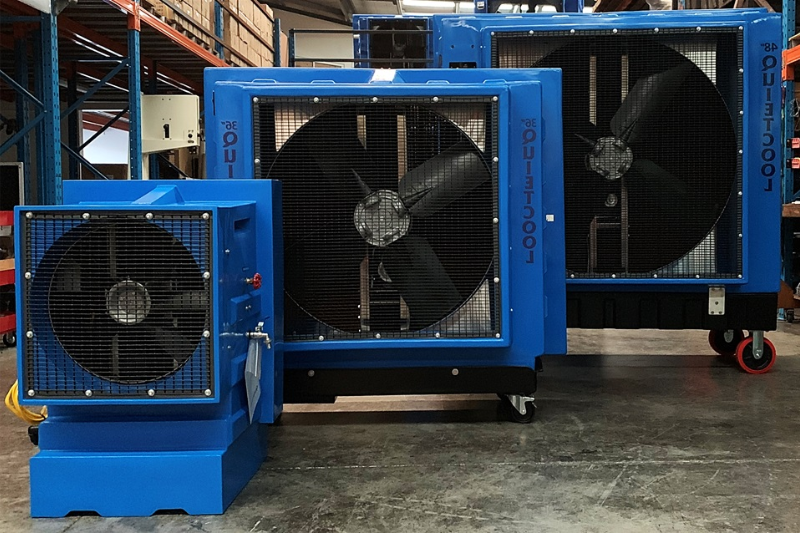Table Of Contents
Keeping our homes cool and comfortable becomes a top priority as the temperatures rise. However, with the variety of air conditioning systems available, how do you choose the right one for your needs? Read on to discover the most popular residential air conditioning systems.
Central Air Conditioning Systems
Regarding whole-house cooling, central air conditioning systems take the lead. These systems are designed to cool your entire home by distributing cool air through a network of ducts.
Central AC systems have two main components: outdoor and indoor units. The outdoor unit comprises the compressor, condenser, and fan, while the indoor unit houses the evaporator coil and air handler. Together, they work seamlessly to provide efficient cooling for your entire home.

How central air conditioning systems work
Central air conditioning systems extract warm air from inside your home, cool it down through refrigeration, and then distribute the chilled air back into your living spaces. The ductwork is vital in delivering the conditioned air to each room, ensuring consistent temperature control throughout your home.
Benefits of central air conditioning systems
Central air conditioning systems offer several advantages that make them a popular choice among homeowners:
Efficient cooling for large spaces
One of the main benefits of central air conditioning is its ability to cool large areas effectively. The powerful cooling capacity of these systems ensures that every corner of your home receives the desired level of comfort.
Consistent temperature control
Central air conditioning systems provide precise temperature control, allowing you to set and maintain a comfortable indoor environment. Say goodbye to hotspots and uneven cooling!
Improved indoor air quality
Central systems often include air filters that remove dust, pollen, and other allergens, enhancing indoor air quality and relieving allergy sufferers.
Increased home value
Installing a central air conditioning system can increase the value of your home. It’s a desirable feature for potential buyers and can make your property stand out in the real estate market.
Types of central air conditioning systems
Central air conditioning systems come in two main types:
Split system
The most common type, a split system air conditioner, constitutes an outdoor unit and an indoor unit. The outdoor unit features the compressor and condenser, while the indoor unit comprises the evaporator coil and air handler. These components work together to cool and distribute air throughout your home.
Packaged system
In a packaged air conditioning system, all the components are housed in a single unit, placed on the roof or near the foundation. These systems are ideal for homes without sufficient indoor space for an indoor unit.
Factors when choosing a central air conditioning system
When selecting a central air conditioning system, consider the following factors:
Size and capacity
Ensure that the system you choose is appropriately sized for your home. A system that is too small will struggle to cool your space, while an oversized system may result in inefficient operation and higher energy costs.
Energy efficiency
Look for systems with high SEER (Seasonal Energy Efficiency Ratio) ratings. Higher SEER ratings indicate better energy efficiency, lowering energy bills and reducing environmental impact.
Noise levels
Consider the noise levels produced by the system. Look for models with features such as sound-dampening technology to ensure a quiet and peaceful indoor environment.
Maintenance requirements
Find out about the maintenance needs of the system. Some systems require regular filter changes and professional tune-ups, while other brands have self-cleaning features or low maintenance requirements.
Cost considerations
Consider the system’s upfront cost, including installation charges and long-term operating costs. Remember that investing in a high-quality, energy-efficient system may save you money in the long run.
Ductless Mini-Split Systems
Ductless mini-split systems offer an alternative cooling solution, particularly for homes without ductwork. These systems provide zone-based cooling and have gained popularity in recent years.
Ductless mini-split systems constitute an outdoor unit and one or more indoor units. Unlike central systems, these units are connected by refrigerant lines and require no ductwork.

How ductless mini-split systems work
Ductless mini-split systems work on the same principle as central air conditioning but without ducts. The outdoor unit features the compressor and condenser, while the indoor units are mounted on walls or ceilings in different zones of your home.
Benefits of ductless mini-split systems
Ductless mini-split systems offer several advantages worth considering:
Zone cooling and heating
You can cool or heat specific areas based on occupancy and preferences by having individual indoor units in different zones of your home. This zone-based control can result in energy savings and personalised comfort.
Energy efficiency
Ductless mini-split systems are highly energy-efficient. Since there are no ducts, no energy loss is associated with air leakage, a common issue in central systems. Additionally, cooling or heating only the occupied zones further enhances energy efficiency.
Flexible installation options
Ductless air conditioning systems are easy to install since they require no ductwork. They are an excellent choice for older properties or spaces where duct air conditioner installation is impractical or costly.
Improved indoor air quality
Ductless systems often include built-in air filters that help remove allergens and pollutants, ensuring cleaner and healthier indoor air quality.
Quiet operation
Ductless mini-split systems operate quietly, providing a peaceful and undisturbed environment in your home.
Factors to consider when choosing a ductless mini-split system
When selecting a ductless mini-split system air conditioner, consider the following factors:
Number of zones
Determine how many indoor units you will need to cover the desired zones in your home. Assess your requirements based on room size, occupancy, and individual preferences.
Cooling and heating capacity
Ensure that the split system air conditioner you choose can provide adequate cooling and heating capacity for each zone. Proper sizing is crucial to ensure optimal performance and efficiency.
Energy efficiency ratings
Look for systems with high SEER ratings for cooling efficiency and HSPF (Heating Seasonal Performance Factor) ratings for heating efficiency. These ratings provide insights into the system’s energy-saving capabilities.
Installation requirements
Consider the installation process and requirements. Placement of the indoor units, outdoor unit location, and refrigerant line routing are essential factors to discuss with a professional installer.
Cost considerations
Evaluate the upfront costs, including purchasing the split system air conditioner and professional installation—also factor in long-term energy savings to determine the system’s overall cost-effectiveness.
Window Air Conditioning Units
Window air conditioning units are popular for cooling individual rooms or small spaces. These compact units are easy to install and offer a cost-effective cooling solution.
Window air conditioning units are self-contained systems that fit into a window or a specially designed opening in a wall. They are designed to cool a single room or a small area.

How window air conditioning units work
Window units comprise a single box-like structure that houses all the components necessary for cooling. The unit draws in warm air from the room, cools it down using refrigeration, and releases the cooled air back into the space.
Benefits of window air conditioning units
Window units come with their own set of advantages:
Affordability and easy installation
Window air conditioning also known as box air conditioning units are generally more affordable than central or ductless systems. They are also easy to install and require minimal modifications to your home.
Suitable for small spaces
Window units are an excellent choice if you only need to cool a single room or a small area. They provide efficient cooling for bedrooms, small apartments, or home offices.
Portability
Window units are portable air conditioners. They are relatively easy to remove and reinstall, making them suitable for renters or those who frequently move homes.
Individual room cooling
With window units, you can cool specific rooms based on your needs. This can help save energy by focusing cooling efforts on occupied spaces.
Choosing a window air conditioning unit
When selecting a window air conditioning unit, consider the following factors:
Room size and cooling capacity
Ensure that the unit you choose matches the cooling capacity needed for the room. Units with insufficient cooling power will struggle to maintain comfortable temperatures.
Energy efficiency
Look for models with high Energy Efficiency Ratio (EER) ratings. Higher EER ratings indicate better energy efficiency, resulting in lower energy bills.
Noise levels
Consider the noise levels produced by the unit. Look for models with sound-dampening features to minimise noise disruption in your living spaces.
Maintenance requirements
Check the maintenance needs of the unit, such as filter cleaning or replacement. Opt for units with easy-access filters for hassle-free maintenance.
Aesthetics and space considerations
Consider the unit’s appearance and how it fits into your window or wall opening. Take measurements to ensure proper fitment and consider any aesthetic preferences.
Evaporative Coolers
Evaporative coolers, also commonly known as swamp coolers, offer an energy-efficient and eco-friendly cooling option, particularly in dry climates. Let’s explore their features and benefits. Evaporative coolers work on evaporating water to cool the surrounding air. These systems are particularly effective in arid regions with low humidity levels.

How evaporative coolers work
Evaporative coolers draw in warm air from the outside and pass it through a wet cooling pad or medium. The water evaporates as the air passes through the pad, causing the air temperature to drop. The cooled air is then circulated throughout your living spaces.
Benefits of evaporative coolers
Evaporative coolers offer several advantages that make them a popular choice:
Energy efficiency
Evaporative coolers use significantly less energy compared to traditional air conditioners. They rely on the natural evaporation process to cool the air, consuming less electricity and lowering energy bills.
Eco-friendly cooling
Evaporative coolers do not use refrigerants or emit greenhouse gases, making them a greener cooling option. They also utilise natural resources, such as water and air, without harmful environmental impact.
Cost-effective operation
The operating costs of evaporative coolers are generally lower than those of conventional air conditioners. These systems require minimal maintenance and have lower upfront costs.
Humidity regulation
Evaporative coolers moisten the air, which is beneficial in dry climates. They help combat dryness and can provide relief for those with respiratory conditions.
Factors to consider when choosing an evaporative cooler
When selecting an evaporative cooler, consider the following factors:
Climate suitability
Evaporative coolers work best in dry climates with low humidity levels. They are less effective in areas with high humidity, where evaporation is hindered.
Cooling capacity
Ensure that the cooling capacity of the evaporative cooler matches the size of the space you intend to cool. Sizing the unit correctly is crucial for optimal performance.
Maintenance requirements
Check the system’s maintenance needs, such as regular cleaning and pad replacement. Opt for models with accessible components to simplify maintenance tasks.
Installation considerations
Evaluate the installation requirements of the cooler, such as access to a water source and proper ventilation. Consider the placement of the unit and the space it will occupy.
Making the Right Choice for Your Comfort
Remember, investing in the right air conditioning system provides a comfortable living environment, improves energy efficiency, and adds value to your home. So don’t delay—start exploring your options today and enjoy a cool, refreshing space all year round. Invest in quality systems from companies like Mitsubishi Heavy Industries for better performance and efficiency. For best results, consult a professional for assistance.



